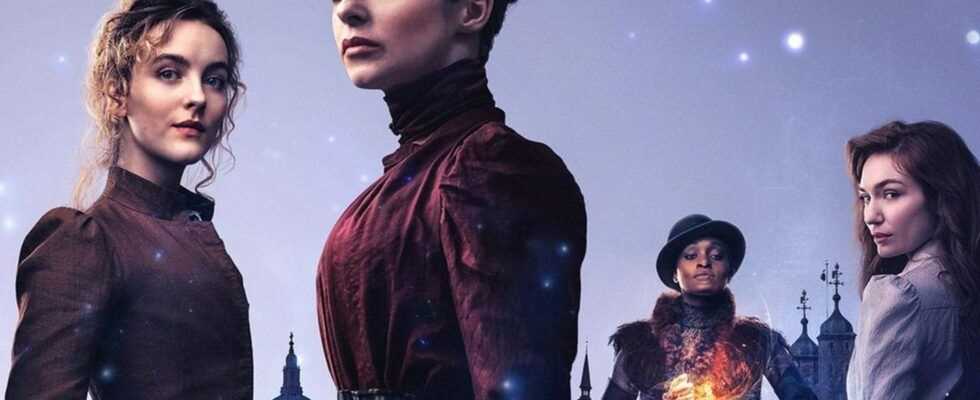The Nevers
The female “X-Men” mutants in the Victorian corset
Woman power in the 19th century: the protagonists of the new series “The Nevers”
© (c) Home Box Office, Inc. All rights reserved. HBO®
Historical and heroic: The new series “The Nevers” mixes the superhero genre with an elaborate, Victorian backdrop.
If the dream factory lets itself be carried away with a daring mix of genres, it usually does so as strikingly as possible. In “Cowboys & Aliens” Daniel Craig (53) and Harrison Ford (78) fight side by side – as cowboys against aliens. In “Pride and Prejudice and Zombies” – rather uncharacteristically Jane Austen – the undead suddenly gnawed at the cage crinolines of the Victorian ladies. And we don’t even want to start with “Abraham Lincoln Vampire Killer”.
The new series “The Nevers”, which will celebrate its German premiere on April 12th on Sky Ticket and Sky Q on demand as well as linearly on Sky Atlantic immediately after the US launch, is much more subtle in terms of its title. But she, too, plays during the reign of Queen Victoria (1837-1901) and she too is highly supernatural. She calls people with the most varied of superpowers “The Touched” and so, as it were, puts the mutants of the “X-Men” in the Victorian corset. But unlike the rather uncomfortable item of clothing, it doesn’t restrict narrative – on the contrary.
Curse or blessing? It’s all about this
The reign of Queen Victoria is nearing its end when the so-called “Touched” suddenly appear in London. These – mostly women – have inexplicable abilities and / or physical characteristics and cause concern above all for those groups who want to hold onto their power: the church and the upper class.
One of the “touched” is Amalia True (Laura Donnelly, 38). The young widow has made it her business to stand up to the British elite – practically so that she has the ability to see small parts of the future. She gets help from Lavinia Bidlow (Olivia Williams, 52), a rich woman without superpowers who gives shelter to many of the “touched” in her orphanage. And Amalia’s best friend Penance Adair (Ann Skelly, 24, “Vikings”) also proves to be extremely helpful: She is one of the first to be “touched” and, not least because of her technical superpowers, an extremely progressive woman.
Lots of familiar faces
For the cast, “The Nevers” relies on an experienced but fresh cast. Laura Donnelly as Amalia True is known to horror fans from the movie “Dread” and hobbit fans from “Tolkien”, the biopic about the “Lord of the Rings” author. Olivia Williams, however, already knew how to inspire in “The Sixth Sense” and can soon be seen in the Oscar-hoping “The Father”. And anyone who knows and loves even part of the Cornetto trilogy by Simon Pegg (51) will be delighted that his congenial partner Nick Frost (49) is part of the party as the charming and dangerous beggar king Declan Orrun .
Class struggle with superheroes?
While some other genre weddings seem forced and artificial, it makes sense that “The Nevers” brings together the Victorian era and superpowered female characters. Brief history excursion: Around 1870, the struggle for women’s suffrage and thus for more equality became a nationwide movement in Great Britain. This results in a rather clever symbolism for “The Nevers”: Of course, women who show unimagined abilities should be treated with caution or even rejection – they represent a danger to the established patriarchy.
The “X-Men” comics originated in the USA in the 1960s and are representative of the Civil Rights Movement and the suppression of minorities, “The Nevers” illuminates the struggle of the suffragettes of yore, who also organized themselves in various groups. The series does not degenerate into the political moral story, however, “The Nevers” does not take itself too seriously and with action and also sci-fi elements clearly puts entertainment in the foreground.
No classic good versus evil
The creators of the series have not made the mistake of spinning a disdainful “good versus evil” story out of it, in which every male figure is portrayed as a tyrant and every woman as innocence in person. The protagonists are given motives for their actions that can be understood – sometimes more, sometimes less – and which go beyond pure malice. So if you are in the mood for superheroes with impressive skills and even more impressive clothes, “The Nevers” will whisk you away from April 12th to the 19th century of a different kind.
